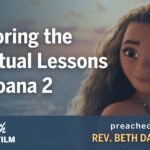Doing the Impossible | Rev. T. J. FitzGerald | 05.12.24


Sermon Transcript
This isn’t the first time I have preached on Mother’s Day at church. I hope it won’t be the last. In fact, I remember the first time I did it distinctly ,when the only people up on the chancel and church that Mother’s Day at service were three gay guys with no kids. A few months after the service, I was talking to a congregant who said how offended she was by that. I was a little speechless. She didn’t get into the details of why she was offended. I don’t know if it was all the gay guys or it was that we weren’t parents, but I didn’t really want to know the reason for her offense. I didn’t really have the heart to hear it, what she was thinking, because I wanted to keep liking her as much as I did. I still like her. I love her, in fact, even though she found my presence on a day like this in the pulpit to be offensive. So for those of you who may find my presence offensive today, let me just say, keep it to yourself.
T. J. reflects on his mom
Because I have a mom who I love very much. Some of you met her when she was here and visiting for my affirmation service in October. And because I’ve been mothered friends, with every passing day, all I see in the world and every new story I hear about parenting and child relationships, I grow each day in greater appreciation and love for both of my parents. So before I say anything else, mom, wherever you are, you may not be watching, Happy Mother’s Day. Your kindness, your love, your trust, your understanding and your great humor are treasures that I wish everyone could have, but they were mine and I’m grateful for them. Thank you.
My mom is actually a reading specialist, a bit of an extraordinaire, crisscrossing the country at parts in her life doing all kinds of things in furtherance of literacy and helping people learn to read a lot longer than I have been alive. I’m proud to tell stories about how she secretly liked the kids that acted up in class the most. It helped having a child like me to practice that with. How she also helped college basketball players get their reading level up so that they could keep their playing career and their academic career on track. My mom’s just below five feet tall, so the image of it all her students was pretty entertaining. And even her work starting libraries as part of her work with a group in retirement where there have been no libraries before. I brag about these things because the kind of things that are easy to talk about and people like to hear.
What I don’t often brag about as much is that I have a mom who in some of the darkest and scariest parts of our early family life and my childhood risked everything she knew to protect us, like the lion-hearted mom that we read about. And in the end, she saved our family and brought us closer together. I’m the child of a mom like that. So that’s the God’s honest truth. And maybe if I had explained that better all those years ago, that congregant wouldn’t have been so offended. The world may never know.
The library is open
That’s right. And the library is open. Those of you clapping probably spend as much time as I do watching RuPaul’s Drag Race. For those of you wondering what on earth is going on, the mother of the greatest drag queens of our day is RuPaul Charles, and she invites her contestants regularly to partake in the art form, known as reading. That comes from the underground New York ball and drag scene. Reading is when you look at someone critically and let them know what’s a little out of place with them. And it’s best when it’s done with some wordplay, maybe some dry humor, but most importantly, with love.
So let’s open the library on Mother’s Day, shall we? Oh, Mother’s Day, thank you. Thank you for this annual reminder of the way I’m failing to meet the impossible standards of motherhood held by people who don’t know my life. I’ll see you next year in hell. Oh, Mother’s Day. I love celebrating you at church and being told all about Mary, the mother of Jesus, because nothing makes me feel more seen and more understood than a model of motherhood who was a Virgin. Mother’s Day, Mother’s Day, Mother’s Day. I’m not saying you’re out of touch, but the last time you made real sense, Lincoln wasn’t even on our sense yet. That’s a thinker. Yeah. All that being said, the library is closed.
But it is fitting that I was raised by an expert in reading and literacy because reading is what? You can do better than that. Reading is what? “Fundamental.”
The origin of Mother’s Day
But that last one I read is true. Mother’s Day has mothers. Its birth dates back to 1870 after the Civil War. The origins of Mother’s Day flow, of course, from Unitarian beginnings. The origins of Mother’s Day are with Julia Ward Howe, the great poet lyricist and abolitionist in the latter part of the 19th century began a tradition called Mother’s Day of Peace. And that is when she published a proclamation and I quote, “For mothers to gather on this day, leaving the duties they were accustomed to performing for a day of counsel on the chance all mothers uniting together might have to bring about peace on earth or at least peace in a broken nation.”
After the Civil War ended taking more than half a million young lives from their families, the goal of the Mother’s Day for Peace was to convene and strategize ways to prevent such loss of life ever from happening again. But this original tradition actually didn’t last long as much as we like to remember it. In some places it persisted in a way, but not by much. It was actually in 1907 when a Methodist named Anna Jarvis made it her cause to have a permanent Mother’s Day, and Anna was the kind of person who followed through on things. Her idea was more like what we see today with the YMCA even getting involved, that helped along the way. It was the time to pause and reflect on the mothering we received. And then she even got Woodrow Wilson, the president at the time, to make it a national holiday. And Anna Jarvis got to watch her idea of Mother’s Day come to be. To be born.
But also, like most moms, she had some thoughts about how her darling little creation was growing up. When her baby holiday grew to say, its mid-30s. She had this to say about it. I quote, “I wanted it to be a day of sentiment, not profit. She did not like store-bought flowers. She wanted people to grow the blossoms at home. And she also had something to say about pre-printed greeting cards made by companies too.” And I quote, she called them, “A poor excuse for the letter. You are too lazy to write.”
I feel like Anna would’ve liked it here. I know she was. Yeah, I think if Julia and Anna were here, they might have been comfortable, shall we say, in the library. And our readings today help us see the breadth of motherhood in human lives. And our first reading, the title is also the first line of the poem because the poem actually starts with a grandmother saying, why not? Which is how many things begin. The poem shows how making food together is making community together. And grandmother knows exactly what has to happen and invites all the others to join in. Neighbors and relatives come together to see it through the communion of labor, marshaled to nourish a gathering of souls. And there’s always someone on a chair sing love songs. We know that. The poem speaks the truth. We know and that we must be fed. But it says we get to choose by what we are fed and by whom.
The food the poet speaks of are the messages, are the words and ideas that mothers or those who mother let into their minds and thus into their bodies. To define them, to set the standards for them. And it suggests doing that with great care and doing it in a community of love. Then May Sarton’s truth telling speaks to something very hard for many of us here, I know. Missing your mom. I know many of you share that with her, especially you parents who wish you could call your mom and ask what I’m supposed to do next.
But when you’re in those times, maybe you’ll find some comfort in Sarton’s words that I remind you now. I summon you now not to think of the ceaseless battle with pain and ill health, the frailty and the anguish. No, today I remember the creator, the lion-hearted. And those are just a few thoughtful poets takes on mothering.
The expectations of motherhood
But what does our wider culture tell us? The expectation of mothering in the US and a lot of culture is what? What’s the expectation? Perfection. Impossible. All right. We are on the same page. And that is why I think mothers are the only people qualified in this world who are actually trained for years to do and accomplish the impossible or try I. Regardless of age, education, marital status, occupation, or any other marker. No matter where you’ve ascended or descended on somebody else’s idea of a hierarchy, the world still, still, expects perfection from moms and thought and deed all the time.
Then, the labor required on top of that, to ignore, to not listen, to fight. This wave of expectations is just another thing a mom has to deal with. Sometimes it’s actually easier to just keep trying to do everything right, just trying to keep everything perfect because to do the impossible, to fight back against these unreasonable expectations is impossible. And we need to find a more realistic framework for living. Because frameworks are essential to our thinking. They’re essential to our action. So it’s fitting that this week, this congregation, by unanimous vote of its board of directors, has become a SACReD designated congregation, part of the SACReD Alliance nationwide. Yes.
Motherhood and the fight for reproductive rights
SACReD stands for the Spiritual Alliance of Communities Committed to Reproductive Dignity. And in this past week, we were at a conference in New Orleans all about SACReD. Daniel and I were there and he got this lovely stole because he was on the founding board. And we had about a dozen or so of us in New Orleans, didn’t we? I see some of us made it back, which is great.
I’ve taught the SACReD curriculum twice now here at this congregation, it’s a curriculum based on the tenets of the reproductive justice framework, which centers the experience of Black women as a framework for learning and for advocacy. And its four tenets are these. The human right to have a child, the human right, not to have a child, the human right to parent children in safe, sustainable communities, and the human right to bodily autonomy. That’s right. SACReD advocates for all of these things in the public square. Now at this conference, after we presented our portion, our little, what would you call it?
Workshop?
Our workshop. I mean I was there, but it was New Orleans, so. It was a workshop about how we uphold these principles through the pillars of work we do in this community. A colleague of ours from Los Angeles wanted to talk a little bit more about the way we accompany travelers a little. And when those moments happen, when I start to speak about something that is so challenged and vilified by so many in our culture, even though I’m probably more confident than most in the legality and certainly the morality of accompanying people through every part of their life and every choice they make, including the choice they may make to have or not to have a child, even though in my brain I know these things, my body still gets nervous.
I started to hesitate a little bit talking with her when I talked about the details of our work. I was getting a little vague. And she pulled up her sleeve in that moment to reveal a Black power fist tattoo on the inside of her wrist. And without another word, I knew we could speak freely and that we’d be safe. And I have been reflecting on that since it happened.
And on the tenets of reproductive justice movement and framework and some questions have come up for me. What is a nation, where a black woman wearing a sign of support for the collective power of Black people or where a movement advocating for basic human rights are seen as, outside the norm, as a secret password? Or more than that, what is a nation where these acts are seen as radical ideas to be spoken of in hushed tones? Because I tell you what, until Black mothers in this country have the same health outcomes for childbirth as every other kind of mother, a little radicalization makes a lot of sense.
Birthing parents in Texas who are Black are three times more likely to die in childbirth than any other group. A little radicalization makes a lot of sense. Any framework, social, political, educational, health related or otherwise that perpetuates this dangerous inequality in the name of all that is holy must change, must be changed, cost what it may. No one is parenting in real safety until everyone is parenting in real safety.
And I know I am saying that when a lot is on our hearts, a lot is on our hearts for children afar right now. This week, the closing of Borders where help and aid was coming in Gaza means less aid will be coming to that area which threatens even further the health and basic needs of children there. Not to mention the military actions in the same region, and it is hard for many today I know to celebrate with much freedom this day.
There’s a lot of anxiety around this day to day, when parents and children around us in afar struggle to hold to even the most basic assurances of basic human rights and that feeling, that feeling is part of what the reproductive justice framework is trying to tell us, that no one is parenting in real safety until everyone is parenting in real safety.
I wonder, I wonder, if that woman so offended by my presence all those years ago might really have been wishing I was more aware, that I was more radical, more challenging to those who think mothering as we experience it today is anything short of doing the impossible but changing that, I get it isn’t easy. At the SACReD Conference, sitting there as a non-parenting, non-generative bachelor. I felt at times I didn’t fit in. Like this work, this isn’t for me. I don’t fit in here. And then I’ve been thinking about that the last few days. It is not SACReD’s fault that there were not more people there like me. You hear what I’m saying? That’s my fault. Maybe next time when I’m inviting people, I’ll invite some more people just like me. And we’re going to have a lot of fun in New Orleans, I’ll tell you that. Because you better believe gay parents are under attack too. That’s right. No one’s parenting in real safety, until we all are.
The beginning of a movement that is planned to span decades is an exciting time. And staying with that movement, sticking to it and supporting it in its nascent stage can be one of the most rewarding experiences on earth. Plus when it turns 30, you get to be like Anna Jarvis and tell it about itself a little bit, which is fine. The potential of this movement or any movement you want to be part of that you might want to find that trains us to see the world a little more clearly, to read society through a new pair of glasses and to proclaim the truth with all the honesty we can muster and join in is all that ever has is all that ever will do the impossible. And what better day to try the impossible than Mother’s Day?
The library is open children, get reading, and amen.







